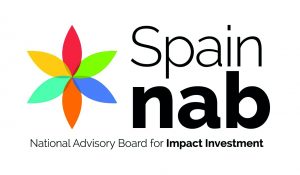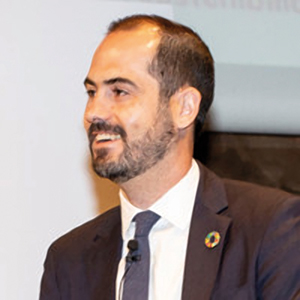Spain NAB: Setting Agenda for Spanish Impact Investment Market
 At an estimated €90m[1], Spanish impact investment is considered an incipient market by European standards[2], well behind Germany, France, Italy and even Portugal.
At an estimated €90m[1], Spanish impact investment is considered an incipient market by European standards[2], well behind Germany, France, Italy and even Portugal.
This market counts 14 impact funds[3], and has been developing slowly over the past 10 years out of individual private initiatives from different sectors interested in supporting and financing social enterprise.
This has taken place through projects linked to incubators and accelerators, and funds with below-market profitability expectations. Microfinance and ethical banking have been leading the charge, and are well-established actors of the ecosystem.
“The supply of capital for impact investment in Spain is limited. The investment culture is dominated by a dichotomy between philanthropy and traditional investment.”
The most recent figures from the OECD[4] rank BBVA Microfinance Foundation as world leader in impact investing in developing countries, with some $ 1.2bn of philanthropic[5] debt instruments disbursed in the 2017-2018 period, followed by the Grameen CA Foundation with $37m. Caixa Microbank granted €773m in microloans to families, small companies and entrepreneurs in 2018, growing its loan portfolio to a total of €1.5bn.
In ethical banking, the total loan portfolio in Spain amounted to €1.5bn in 2018[6].
These actors — led by three pioneers: Eurocapital EAF, Open Value Foundation, and UnLtd Spain — got together in 2018 to create a National Advisory Board for Impact Investment, called Spain NAB, to join the GSG (Global Steering Group for Impact Investment) by June 2019.
Working with more than 70 organisations from the Spanish impact investment sector to identify the main roadblocks for supply, demand and intermediation, and to build a consensus on the measures required to grow the market, Spain NAB has created a cohesive community with a clear agenda.
This consists of five recommendations prioritised from the more than 100 produced. Spain NAB has ambitions to grow the market four times by June 2021, to a figure of some €360m.
The recommendations:
1. Strengthen social enterprises through incubators and accelerators
Supporting social enterprises in the initial stages of their development is a good strategy to generate positive impact on society in the medium and long term. Some companies have difficulty accessing financing due to their hybrid nature. Spanish incubators and accelerators play a key role in strengthening and training social enterprises from the social economy, as well as those set under common corporate law. Supporting the work of these entities, and their capacity to offer technical assistance and financing, is vital to developing the full potential of social entrepreneurship and the impact investment market.
1.1 Creation of an alliance of social incubators and accelerators to share best practices, standardize processes and cover the different needs of social enterprises.
1.2 Creation of a support programme through subsidies (or adaptation of existing ones), with public and / or private capital, to cover the costs borne by social incubators and accelerators to support and offer technical assistance to entrepreneurs.
1.3 Creation of a financing vehicle, with public and / or private capital with no expectations of financial return, for social enterprises in their initial phases (idea / pilot).
1.4 Creation of a financing vehicle, with public and / or private capital, for social enterprises in seed and start-up phase.
1.5 Creation of a financing vehicle, with public and / or private capital, for innovation and transformation projects at consolidated social enterprises.
2. Attract public and private funds to catalyse impact investing
The supply of capital for impact investment in Spain is limited. The investment culture is dominated by a dichotomy between philanthropy and traditional investment. As a result, the financing needs of social enterprises are often left unfulfilled.
Since the initial rounds of financing are usually too small and risky for most investors, it is essential to create hybrid instruments catering to the needs of social enterprise. This catalytic capital should lower risk of projects with below-market returns but high potential.
2.1 Use of domestic and supranational public resources to catalyse new impact funds and reinforce existing ones
2.2 Capture Structural Funds from the European Union (2021-2027)
2.3 Create a specific vehicle to invest in different risk-return-impact strategies such as technical assistance, and blending
2.4 Create and distribute dedicated impact funds by private capital asset managers and financial institutions
2.5 Incorporate social and environmental impact variables in the financing offered by financial entities and fund managers
2.6 Participate in the drafting of the Sustainable Finance Plan of the European Union to reinforce the importance of impact investing to institutional investors
2.7 Promote an EU harmonised legal framework (regulatory and fiscal) for venture capital entities qualifying as EuSEF and improve the tax treatment of financing instruments under EuSEFs
2.8 Promote public and private investment instruments that foster innovative structures to enhance social impact.
3. Relying on the capital and knowledge of foundations to boost impact investing
Foundations provide capital and technical assistance to organisations and social enterprises. In many GSG member countries, key initiatives in market development were funded by private foundations.
A key element is the alignment of the missions of foundations with their fiduciary responsibility through impact investing. This has been possible because domestic regulatory bodies have eliminated legal barriers that were preventing foundations from investing according to beyond-profit-maximisation criteria.
Another way to contribute to the growth of the sector is through hybrid instruments in which impact investing is supported by venture philanthropy.
3.1 Clarify the regulatory framework (state and regional) to allow foundations to make mission-related investments, both through their endowment and reserves and their annual budget, based on revenues and income
3.2 Raise awareness and train foundations on the possibilities to use impact investing for mission fulfilment
3.3 Create a joint pilot financial vehicle between several foundations to allocate part of their endowment to impact investments
3.4 Use endowments and reserves of foundations to create new vehicles of patient and hybrid capital that invest through a combination of equity, debt and non-refundable contributions
3.5 Promote venture philanthropy from foundations to support social organizations towards internal transformation processes and financial sustainability
3.6 Promote venture philanthropy from foundations to support social enterprises in their initial stages of development
3.7 Use the budget of foundations to build part of the infrastructure required for the development of the impact investment market (studies, databases, spreading of initiatives).
4. Promote outcomes-based contracts to foster social innovation
Payment-by-results contracts (PbRs) or Social Outcomes Contracts (SOCs) represent an innovation in public procurement and in the provision of social services in Spain.
SOCs represent an obligation for the contracted party to deliver certain impact results instead of specific benefits or services in order to get paid. In these contracts, payments are subject to achieving pre-agreed social impact objectives and require impact measurement. SOCs such as the Social Impact Bond (SIB) have received attention. Here, a public administration commits to pay some investors their initial capital — plus a return based on the results/outcomes delivered by a social provider versus some pre-agreed goals.
SIBs are a tool to align the interests of public administrations, service providers and investors towards preventive and innovative solutions for the “wicked” problems. SIBs can also help to achieve measurable social impact. There are currently several initiatives regarding implementation of SIBs in Spain, with the Barcelona council and the government of Catalunya, the Madrid council, the government of the Basque country, and the government of Navarre.
4.1 Give greater visibility to PbRs that are being implemented in Spain and abroad to raise awareness, and train relevant actors
4.2 Train public administrations on the opportunities offered by PbRs
4.3 Experiment with public policies that promote payment-by-results contracts and evidence-based policies, in order to introduce these mechanisms in the new Public Procurement Law
4.4 Establish a line of financing from the central administration, along with philanthropic resources, which could be blended in to pay for feasibility studies and PbRs design
4.5 Promote the creation of outcomes funds from public administrations to co-finance and expedite implementation of PbRs for innovative projects addressing problems
4.6 Create a pilot for a PbR scheme in which an alliance of foundations acts as the “outcomes payer”
4.7 Establish PbR-dedicated impact investment funds.
5. Create knowledge and market infrastructure to build an impact economy
Market infrastructure is pivotal for the development of new markets. Other countries’ experience demonstrates the importance of having solid and diverse financial and non-financial intermediaries, as well as raising awareness, and training different groups.
Despite a growing interest in impact investing, Spanish actors from the public, social and financial sectors highlight lack of knowledge on the subject as a big challenge. Dedicating resources to research and training is key to providing the knowledge and tools required. Promoting a culture of impact measurement and management is imperative.
5.1 Conduct studies to better understand the characteristics of the sector, for example on the financing needs of social enterprises at each stage of development, or to collect both the social and financial track record of Spanish social enterprises
5.2 Emphasise communication regarding impact investing to increase visibility of domestic and international success stories
5.3 Training on the potential of impact investing for relevant actors in the social, public and private sectors
5.4 Promote the measurement and management of social impact through commonly accepted methodologies and tools
5.5 Create an evidence-based interventions database, including information on PbRs, to share knowledge among public administrations at all levels
5.6 Create a unit costs database to allow measuring and comparing of impact from specific social interventions
5.7 Training and awareness-raising for the new generations to increase perception and understanding of companies as key actors in solving social and environmental challenges.
Spain NAB’s agenda aims at advancing the 2030 Agenda in Spain, leveraging on international experiences and best-practice to mobilise public and private capital to solve the most urgent challenges facing us.
Spain NAB will be working on several projects. The main one is the taskforce on SOCs and Outcomes Funds launched in alliance with Fundación COTEC on an event organised by the Madrid council and Open Value Foundation on January 14. Through September 2020, the taskforce will work with commissioners, social purpose organisations and intermediaries to explore international and domestic initiatives and experiences, and identify barriers and best practices, including the creation of an outcomes funds. Through this taskforce, Spain NAB will produce a toolkit for main users of SOCs (commissioners and social purpose organisations). The taskforce will work on the existing legal and regulatory barriers, which will result in a proposal for a regulatory sandbox, which could allow interested parties to experience with SOCs in a safe and friendly environment.
Footnotes
[1] ESADE and Foro Impacto, 2019, p 26. Hacia una Economía de Impacto: Recomendaciones para Impulsar la Inversión de Impacto en España. www.foroimpacto.es
[2] Maduro, Pasi, Misuraca, 2018, pp 41-45. Social Impact Investment in the EU
[3] ESADE and Foro Impacto, 2019, Anexo 2, p 65. La inversión de impacto en España: Intermediación de Capital. www.foroimpacto.es
[4] OECD DAC statistics, January 2020. Private Philanthropy for the SDGs.
[5] Include foundations’ PRIs and MRIs, impact investments and other non-grant activities with the main goal of promoting economic development and welfare of developing countries.
[6] Barómetro de las Finanzas Éticas y Solidarias, 2018.

About the Authors

Author: Laura Blanco
Laura Blanco is director of knowledge and outreach for Spain NAB, the Spanish National Advisory Board for Impact Investment. Since 2017, she has been studying strategies and instruments for sustainable investments, with a focus on impact measurement methodologies while working as head of research for Nakatomi Capital’s private equity group. Prior to that, Blanco was an investment manager at Baring Asset Management. She started her career in New York as an equity analyst working for UBS and Credit Suisse, earning a spot in both Institutional Investor and Latin Finance Research Olympics. In 2006, she moved to Hong Kong as a principal of fintech start-up Lusight Research to open the Asian market. She holds an MBA from NYU Stern School of Business.

Author: José Luis Ruiz de Munain
José Luis Ruiz de Munain is the CEO of Spain NAB and founder of its Secretariat, Foro Impacto, which successfully led the process of Spain’s entry to the GSG in June 2019. He is a founding trustee of UnLtd Spain, a social entrepreneurship accelerator, and Senior Advisor of the International Venture Philanthropy Center (IVPC), a center of international excellence aiming at creating a Latin American Network of Venture Philanthropy. He has been a consultant for public, private and third sector entities, such as the IDB Lab, PwC, CECA or BBVA, and professor and lecturer in several business schools and universities. He holds a bachelor in Economics and an MBA from IE Business School.
You may have an interest in also reading…
Grant Thornton UAE: Bridging the Gap in Private M&A Transactions
The increased appetite for mergers and acquisitions (M&A) is prevalent at both a regional and global level. This trend presents
Kristalina Georgieva, Managing Director of the IMF: Europe and the Global Recovery in 2021
We are at a point in our history where it is paramount to concentrate on what this crisis entails, what
Arab Countries In Transition: Where are they Heading?
By Masood Ahmed Director of the IMF’s Middle East and Central Asia Department “You can tell whether a man is


















































































